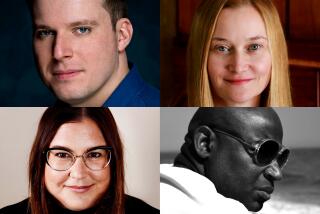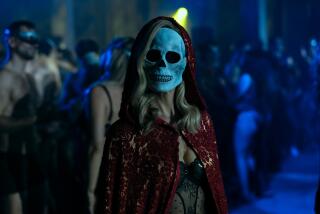In 19th century’s age of science, romantic notions
- Share via
One could easily say that Jeanette Winterson’s novels defy classification, that there is no such thing as a typical Winterson novel. Yet, on closer examination, what one finds throughout her work is a strongly personal, often autobiographical strain (the essence of her arresting first novel, “Oranges Are Not the Only Fruit”) and an unusual imaginative sensitivity to the literary and historical past (yielding such treasures as “The Passion” and “Sexing the Cherry.”)
Narrated in the autobiographical mode by a woman named Silver, Winterson’s eighth novel, “Lighthousekeeping,” summons three spirits from the 19th century. The first, and most conspicuous, is that of Robert Louis Stevenson, the master storyteller of “Treasure Island” and “The Strange Case of Dr. Jekyll and Mr. Hyde.” After the death of her mother, 10-year-old Silver, “part precious metal, part pirate” (shades of Long John Silver), is taken in by a blind, elderly lighthouse keeper named Pew, who, unlike Stevenson’s sinister beggar of that name, is kindly and wise. Although the old man and young girl lead what many would consider a straitened existence in the meagerly furnished lighthouse, Pew nourishes her heart and mind with a rich fund of stories from the past, many of them about a Victorian preacher named Babel Dark, who led a double life.
Unlike Dr. Jekyll, who is horrified by his hidden beastliness, Babel Dark feels more honest and more fully human in his secret life with a woman he’s always loved but lacked the courage to wed. It’s living a lie that he finds worse than “bestial,” as he confides to Stevenson, when that writer (in a brief cameo appearance) talks with him about the disturbing implications of Charles Darwin’s new theory of the descent of man.
Darwin is the second, and most pervasive, Victorian presence, and his theory of a vast and various world in continual flux is not only a central theme in this novel but also a motive for its fragmentary, collage-like structure. Silver’s life story reflects this, from the instant of her conception by a seagoing father she never knew -- “His splintered hull shored him for long enough to drop anchor inside my mother. Shoals of babies vied for life. I won” -- to the harrowing moment in which she loses her remaining parent, who sacrifices her life to save Silver’s.
Contending with the forces of accident, chance and change is the capacity for love. This is the message running through the stories that Pew tells Silver and those that Silver later tells the one she loves.
In contrast to Darwin’s vision of a multifarious and ever-fluctuating material world, Winterson adduces the extravagantly romantic, subjective vision of love offered by a third 19th century figure, Richard Wagner, in his opera “Tristan and Isolde,” where “the world shrinks to a boat, a bed, a lantern, a love-potion, a wound.”
Even in -- nay, especially in -- a Darwinian universe of instability and happenstance, Winterson views the mere existence of love, of life, of Earth itself as nothing less than miraculous: “Darwin overturned a stable-state system of creation and completion. His new world was flux, change, trial and error, maverick shifts ... and lottery odds against success. But earth had turned out to be the blue ball with the winning number. Bobbing alone in a sea of space, earth was the lucky number.”
Like the wandering minstrel in a Gilbert & Sullivan operetta, “Lighthousekeeping” is a thing of shreds and patches: a composite of scenes from Silver’s childhood, episodes from the life of Babel Dark, meditations on love, nature and evolution, a luminous retelling of the Tristan-Isolde legend and an account of the grown-up Silver’s pursuit of love. Somehow, from these variegated threads, Winterson weaves a beautiful and coherent tapestry. Occasionally, the effect is marred by a heavy-handed, almost coy, didacticism.
But more often, she achieves a quality that justly can be called visionary:
“I unlatched the shutters. The light was as intense as a love affair. I was blinded, delighted, not just because it was warm and wonderful, but because nature measures nothing. Nobody needs this much sunlight. Nobody needs droughts, volcanoes, monsoons, tornadoes either, but we get them, because our world is as extravagant as a world can be. We are the ones obsessed by measurement. The world just pours it out.
“I went outside, tripping over slabs of sunshine the size of towns.... The sun was blaring through the walls of the houses and beating down the steps. The sun was drumming time into the stone. The sun was rhythming the day.
“ ‘Why are you afraid?’ I asked myself, because fear is at the bottom of everything, even love usually rests on fear. ‘Why are you afraid, when whatever you do you will die anyway?’ ”
Merle Rubin is a contributing writer to Book Review.
More to Read
Sign up for our Book Club newsletter
Get the latest news, events and more from the Los Angeles Times Book Club, and help us get L.A. reading and talking.
You may occasionally receive promotional content from the Los Angeles Times.






